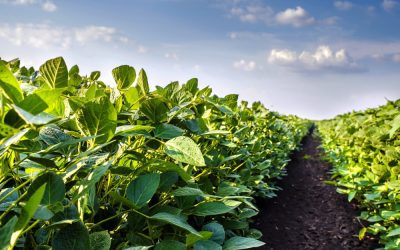2018 Farm Bill extension would ensure continuation of essential programs
By Blair Shipp
ASA State Policy Communications Coordinator
In Washington, D.C., this fall has proven to be quite eventful. The conclusion of a tumultuous U.S. House Speaker race in late October has now shifted attention to the looming possibility of another government shutdown. As Congressional leaders diligently strive to finalize a stopgap spending bill by Nov. 17, the American Soybean Association (ASA) remains optimistic about advancing key bills, such as appropriations, the farm bill and other vital priorities for the soybean industry.
On Nov. 11, House Speaker Mike Johnson (R-La.) unveiled the House Republicans’ plan to prolong government spending beyond Nov. 17. The proposal also includes an extension of the farm bill through September 2024.
If approved by Congress, this extension would guarantee the continuation of vital programs, such as Agriculture Risk Coverage, Price Loss Coverage and Dairy Margin Coverage, ensuring their effectiveness for the 2024 crop year.
“As negotiations on government funding advance, we successfully collaborated to prevent a funding lapse for crucial agricultural programs, offering assurance to producers. It is essential to clarify that this extension does not serve as a substitute for passing a comprehensive five-year farm bill. We remain steadfast in our commitment to work collaboratively to achieve this goal in the coming year,” stated the four leaders of the House and Senate Agricultural Committees in response to Speaker Johnson’s announcement.
Protecting crop protection
Agricultural groups celebrated a significant victory on Nov. 2 following the decision by the 8th Circuit Court of Appeals. The ruling overturns the U.S. Environmental Protection Agency’s (EPA) ban on chlorpyrifos, a vital pesticide for crop protection. The ban had faced scrutiny for disregarding the findings of EPA scientists. This decision reinstates the use of chlorpyrifos in agriculture.
In February 2022, agricultural groups took action by filing a lawsuit against EPA to restore farmers’ access to chlorpyrifos. They cited the EPA’s records, which identified at least 11 low-risk, high-benefit agricultural applications of chlorpyrifos that can be safely maintained.
Growers are eagerly anticipating the return of chlorpyrifos for the 2024 growing season. The absence of this crucial tool in 2022 and 2023 forced many producers to increase their pesticide usage to manage the growing pest populations. For some farmers, this was the only effective tool to protect their crops from economically damaging pests.
In October, ASA spearheaded a coalition of 226 agricultural groups to strongly oppose the EPA’s proposed herbicide strategy under the Endangered Species Act. The groups, in a letter to the agency, expressed deep concern over the potential negative impacts on U.S. agricultural production and conservation efforts. They emphasized the proposal’s complexity, costliness, and onerous nature, highlighting the risks to farmers’ tools for crop protection and conservation practices.
ASA submitted comments urging the EPA to abandon the proposal, asserting its fundamental flaws. Additionally, nearly 1,500 farmers, ranchers, and pesticide applicators voiced concerns in a separate letter, citing the proposal’s complexity, financial burden, and potential threats to herbicide access, impacting both their businesses and environmental practices.
Sustainable aviation fuel
U.S. Rep. Max Miller (R-Ohio) and a bipartisan group of representatives have introduced the Farm to Fly Act, aiming to create new markets for American agricultural products and strengthen domestic energy resources. The bill focuses on fostering the development of sustainable aviation fuel within existing USDA programs, ensuring clarity in eligibility criteria, and promoting collaboration.
Miller highlights the act’s significance in providing farmers access to new markets, driving rural economic development, and strengthening domestic energy.
Specifically, the Farm to Fly Act aims to clarify eligibility for SAF within USDA Energy Programs, encourage collaboration in agency mission areas, and establish a common definition of SAF for effective contributions from U.S. crops. The legislation aligns with the aviation industry’s commitment to transitioning to sustainable fuels and addresses the growing demand for SAF.
ASA strongly endorses the Farm to Fly Act, recognizing its potential to align with broader environmental goals and contribute to the growth of sustainable aviation fuel production.
Phosphate duties slashed
Earlier this month, the U.S. Department of Commerce announced a significant reduction in duties on phosphate fertilizers imported from Morocco, decreasing them significantly from 19.97 percent to just 2.12 percent.
This issue traces back to a Commerce Department decision in 2020 that favored a petition by the U.S.-based Mosaic company to impose duties on phosphate fertilizers imported from Morocco and Russia. Mosaic contended that unfairly subsidized foreign companies were inundating the U.S. market with fertilizers, selling them at exceptionally low prices.
ASA took action in March 2021, filing comments with the International Trade Commission to oppose duties being placed on phosphate imports from Morocco and Russia. These comments were submitted in collaboration with the National Corn Growers Association and the National Cotton Council.
In response to these duties, ASA led other grower groups in an amicus brief to the Court of International Trade, requesting the CIT remand the duties on phosphate imports from Morocco back to ITC and Commerce for recalculation. That suit was remanded earlier this fall, and ASA awaits that reevaluation later this year.
In October, ASA along with its 26 affiliated state soybean associations, including Indiana Soybean Alliance, united with fellow stakeholders in U.S. agriculture to voice concerns regarding the impact of phosphate fertilizer duties. In a letter addressed to Commerce Secretary Gina Raimondo, these organizations underscored the necessity of reevaluating of these duties, emphasizing their broader implications for American farmers.
Posted: November 24, 2023
Category: Indiana Corn and Soybean Post - Winter 2023, ISA, Membership and Policy, News




